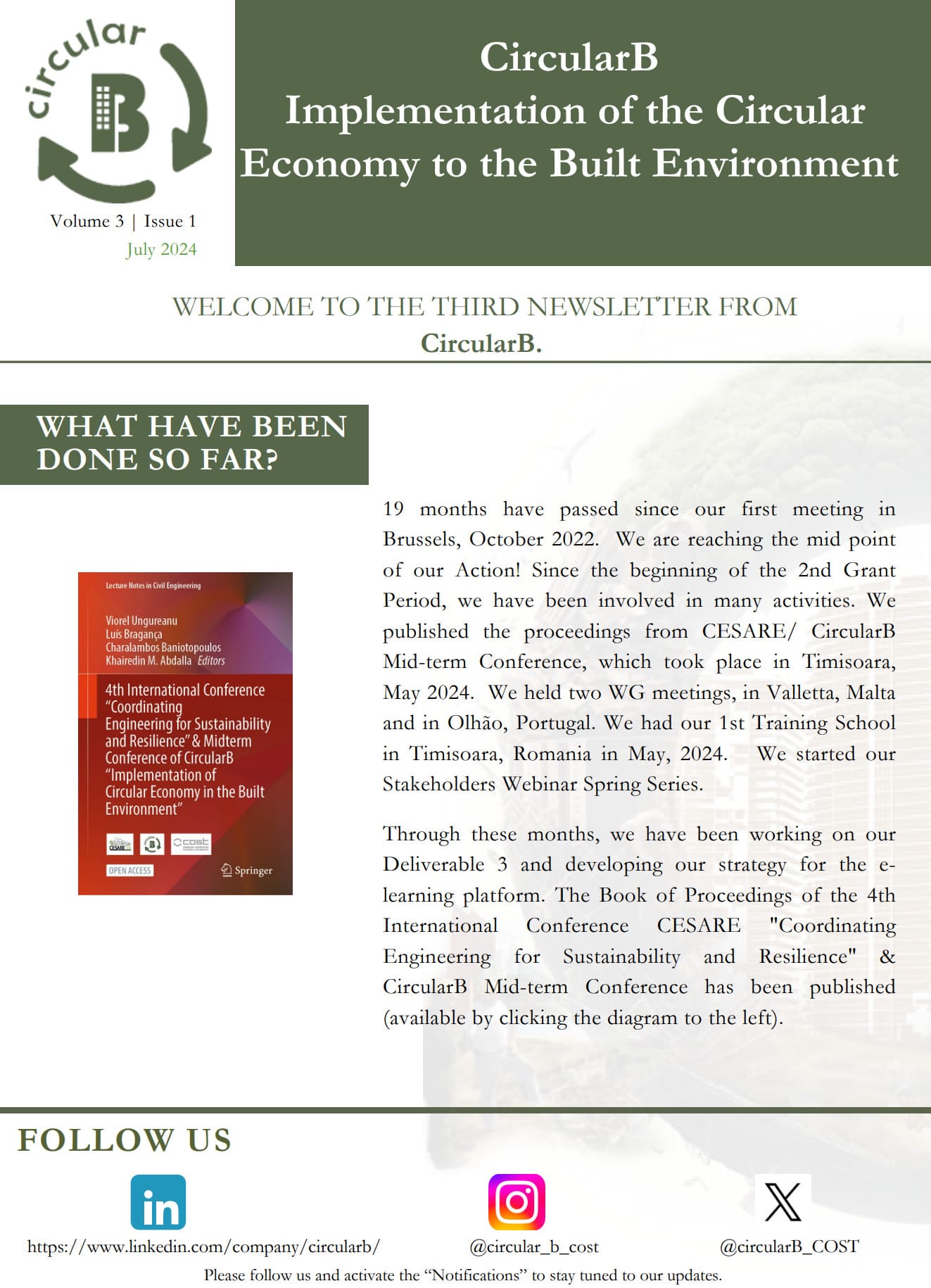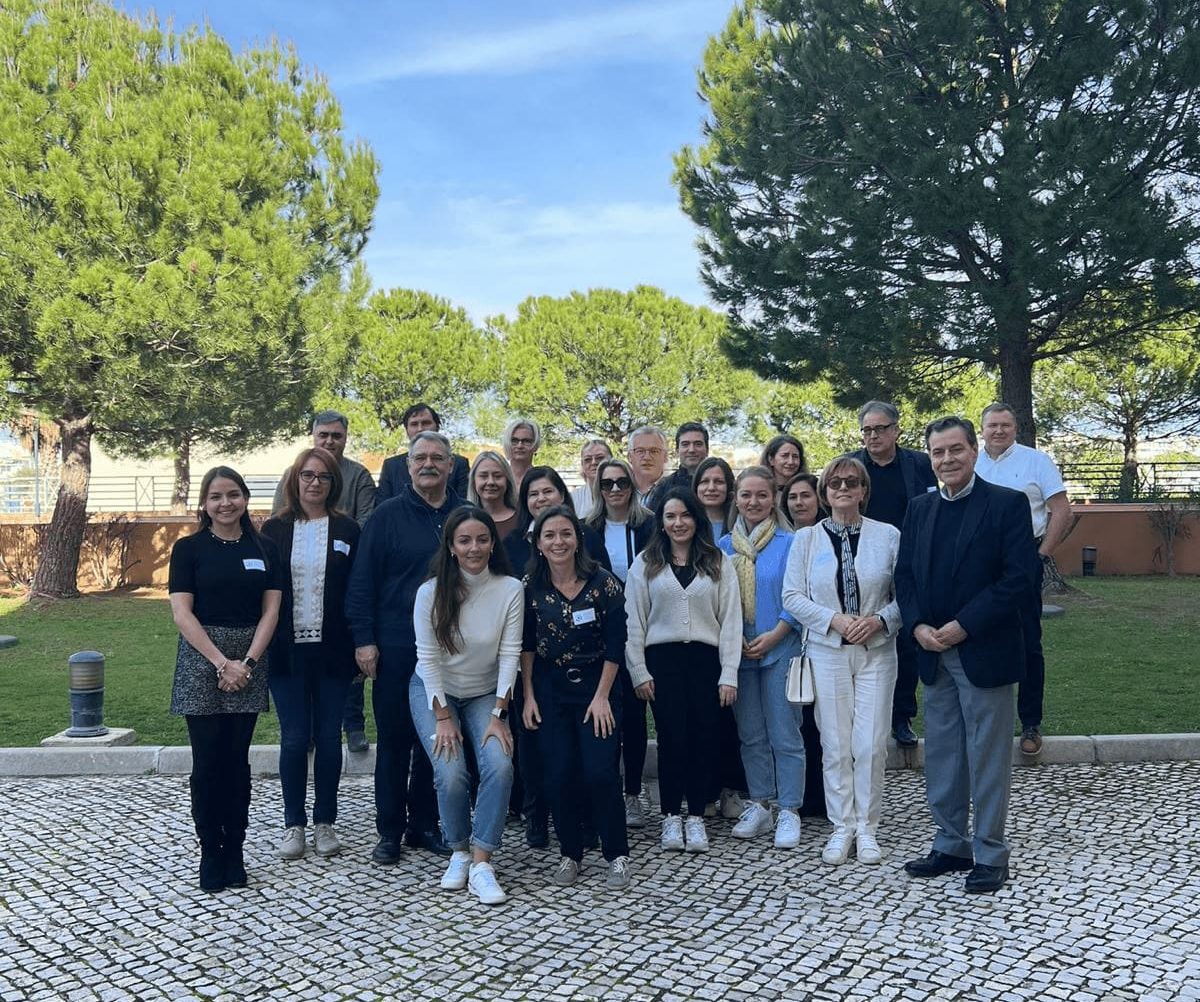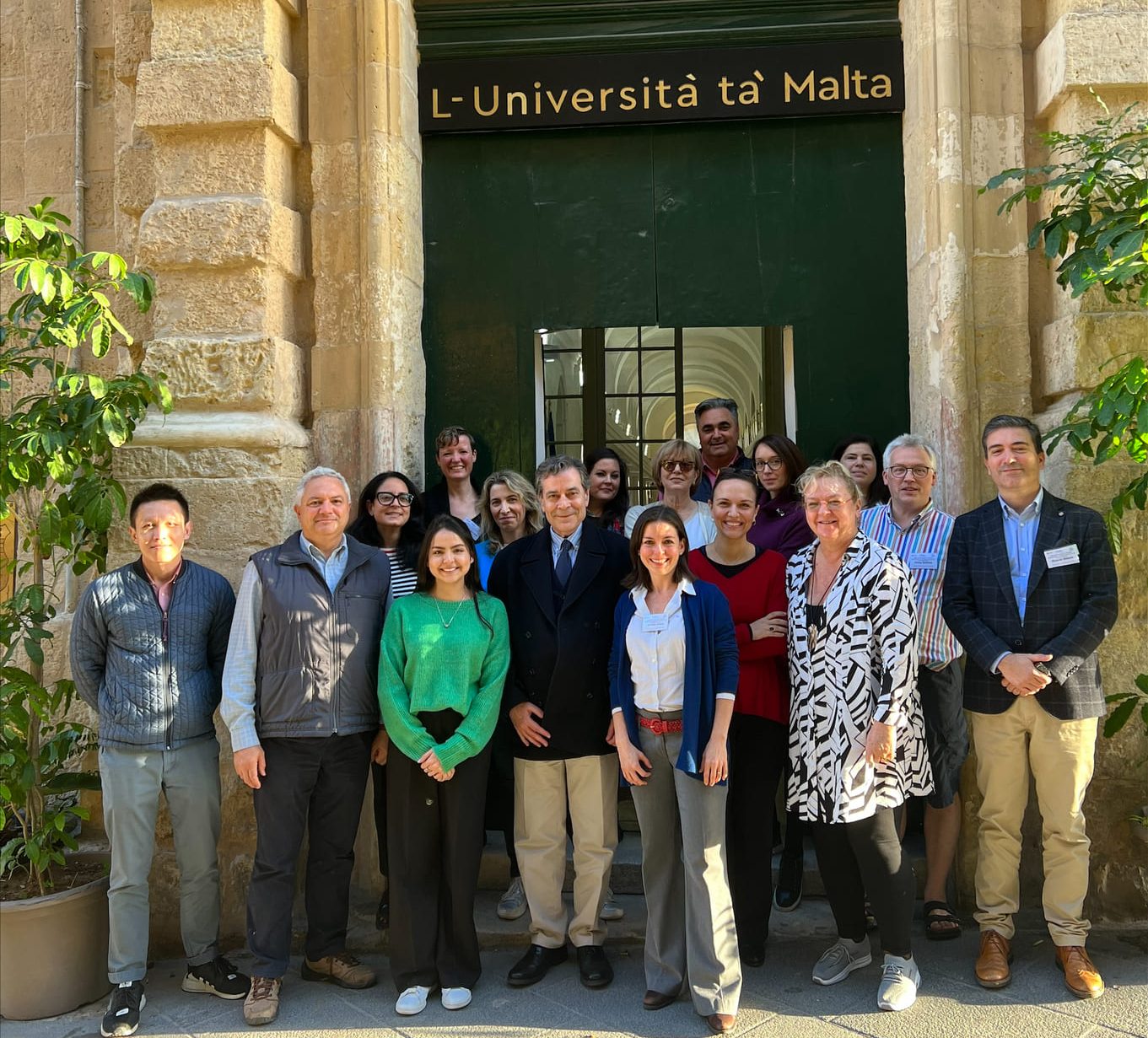The 2nd STSM Call of CA21103 CircularB is currently open until the 11th of March 2024, for STSMs taking place from the 25th of March to the 20th of September 2024.
Description
Short-Term Scientific Missions (STSMs) within CircularB are designed for both young and experienced researchers seeking mentoring and lifelong learning opportunities to advance their career goals and contribute to the development of COST Action CircularB deliverables and the realisation of its objectives. An STSM involves a visit to a host organisation located in a different country from the researcher’s home country of affiliation, for specific work plan to be carried out over a predetermined period of time. STSM applicants must be involved in an official research program as PhD students or postdoctoral fellows, or be employed by or affiliated with an institution or legal entity with a clear and active research mandate. The institutions/organisations where applicants pursue their research during the STSM are considered host institutions. Host institutions provide the necessary infrastructure capacity and knowledge support for grant beneficiaries to complete the proposed STSM.
An STSM grant is a fixed financial contribution towards the grantee’s travel, accommodation, and meal expenses. STSM grants do not necessarily cover all expenses related to undertaking a given mission.
STSM Procedure
1. Formal STSM Application and Documentation
The applicant must initiate the STSM application process by accessing the online registration tool through the e-COST platform and selecting the STSM application tab.
Complete the Online Application Form and upload all required Supporting Documents, which include:
- An up-to-date resume, including a list of the applicant’s publications, if applicable.
- A completed STSM Grant Application Form containing the STSM title, dates, objectives, working plan, expected outputs, and contributions to the Action MoU objectives and deliverables. This form can be downloaded from the application page/supporting documents section on e COST.
- A written agreement from the host institution, confirming the STSM applicant’s ability to carry out the activities outlined in the STSM work plan on the approved dates. (Applicants are advised to secure a preliminary agreement from the host institution before applying.)
- A letter of support from the applicant’s home institution.
- A separate document specifying the STSM duration in days (with a minimum of 5 calendar days, inclusive of travel time) and a Budget Breakdown, detailing justification for accommodation, travel expenses, and per diem allowance in a separate file. Each successful applicant is eligible for up to a maximum of €4000 in total funding, subject to the duration of the STSM and the location of the host institution.
2. Assessment of the STSM
Following the STSM Call closing date, the CircularB STSM Evaluation Committee will conduct a scientific and budgetary assessment of the applications, considering the Action objectives and predefined evaluation criteria. The committee will determine an appropriate funding level for approved applications, ensuring that the awarded Grant does not exceed the amount requested by the applicant.
Incomplete applications will be rejected by the grant awarding coordinator before being reviewed by the evaluation committee.
3. Approval Process
Following the assessment decision, successful applicants will be notified by the COST Association that their application has been approved by the COST Action committee, and a Grant Letter will be sent outlining their rights and duties, as well as those of the Action Grant Holder. Similarly, applications not approved by the COST Action committee will receive a notification accompanied by the MC’s justifications for their rejection.
4. STSM Execution
Grantees must carry out the tasks outlined in their approved application within the specified duration. Any deviations from the work plan or STSM dates must be clearly and reasonably justified. Non-compliance may result in the cancellation or reduction of financial support. In the event of force majeure or closure by the host institution before or during the STSM, please consult the “Handling Travel Derogation Requests” document for guidance.
5. Submitting the End-of-Mission Scientific Report
Upon completing the STSM, grantees are required to upload an End-of-Mission scientific report to the e-COST platform. The report template can be downloaded from the application page on e-COST beforehand. Reports should include a description of the work conducted during the STSM, main achievements, and planned follow-up activities, including proposed joint publications or research proposals if applicable.
In addition to the final report, grantees must submit the host institution’s approval of the successful execution of the STSM, proof of travel to the host institution and accommodation in the host country during the STSM implementation dates, a photo taken during the STSM at the host institution, and a brief testimonial about the STSM experience (covering themes, results, personal benefits, usefulness, and future plans).
End-of-Mission reports must be submitted within 30 days after the STSM’s end date or before 5th October, whichever comes first.
6. Reimbursement
Grant amounts are issued upon STSM completion and approval of all required reports and documentation. Grantees may request up to a 50% pre-payment of the approved grant, subject to fund availability and approval from the Grant Holder Institution. Pre-payment requests should be sent to the Grant Holder Manager atca21103@civil.uminho.pt.
Application approval and payment procedures are facilitated through the e-COST platform and are outlined in detail in the COST Rules. For comprehensive information on eligibility, evaluation and selection, financial support, and grant payment procedures, refer to the rules.
Evaluation criteria
Proposed STSMs will be evaluated based on the following criteria:
1. Relevance and Contribution to CircularB’s Working Groups Objectives and Deliverables (25%)
- Clarity in defining the relevant Working Group(s) and specific deliverable(s) addressed in the proposal.
- Demonstration of how the proposed work plan aligns with and supports the development of upcoming deliverables.
- Identification of participation in the development process of relevant deliverables during or after completing the STSM.
Note: The upcoming deliverables and associated Working Groups are as follows:
- D3: Report on technical challenges and barriers for circular strategies implementation (WG1)
- D4: Circular building design strategies and best practices (WG1)
- D5: E-learning section on CircularB website focusing on best practices and circular solutions (WG1, WG4)
- D6: Report on business models and financial studies (WG2)
- D7: Circular management model and case studies report (WG2)
- D8: Circular KPIs (WG3)
2. Scientific Excellence and Quality of the Proposed Work Plan (25%)
- Assessment of the scientific rigor and innovative aspects of the proposed work plan.
- Feasibility and realism of the planned activities.
3. Promotion of Collaboration and Know-How Exchange (15%)
- Evaluation of the STSM’s potential to foster collaboration and knowledge exchange within CircularB.
- Consideration of both consolidating existing collaborations and establishing new scientific contacts which is particularly encouraged.
4. Realistic Budget Planning (10%)
- Justification of the financial aspects of the application.
- Reasonableness of the estimated expenses.
5. Previous Active Participation in CircularB’s Activities (10%)
- Review of the applicants’ prior involvement in CircularB’s scientific and dissemination endeavors.
6. Other criteria (15%)
- Past participation in a CircularB STSM by the applicant; preference is given to new applicants.
- Geographical distribution of applicants within the same STSM call.
- Gender balance within the same STSM Call.
- Affiliation country; applicants from ITC (Inclusiveness Target Country) nations are given preference.
- Career development; preference is given to young researchers over experienced ones.
- Alignment across Working Groups (WGs).
Note: The final selection of the applicant is the responsibility of the STSMs coordinator and the Chair of the Management Committee of the Action.
Important dates
- Call Opening: 12th February 2024
- Deadline for Application Submission: 11th March 2024
- Communication of Application Evaluation Results: by 22nd March
- STSMs Period: 25th March to 20th September
- Deadline for End-of-Mission Reports Submission: within 30 days after the STSM end date or by 5th October at the latest, whichever comes first.
All applicants are kindly requested to ensure that their applications are aligned with the objectives of CircularB Actions and to consult the STSM guidelines provided in the Annotated Rules for COST Actions, as well as other relevant guidance outlined in the “Handling Travel Derogation Requests” document. For any inquiries not addressed in this call or in the annotated Rules, please reach out to ca21103@civil.uminho.pt.
The full call document can be accessed here.









